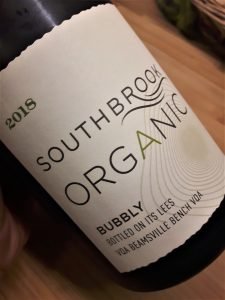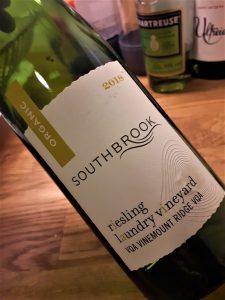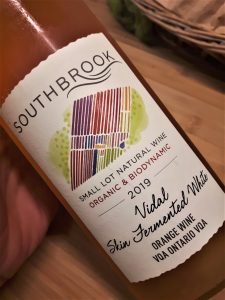Photo credit: Southbrook Vineyards
Re-printing of an article published on JancisRobinson.com
Bill Redelmeier does not believe in half measures. “When I was a kid, I loved collecting things like baseball cards and fossils. Now, I collect certifications” he chuckles. Indeed, Southbrook Vineyards, Canada’s largest organic and biodynamic winery, is certified by Ecocert Canada, Demeter, and Sustainable Winemaking Ontario. What’s more, the estate’s hospitality pavilion was built to a LEED (Leadership in Energy and Environmental Design) Gold Standard.
A slow smile spreads across Redelmeier’s face when I ask what inspired this zeal for sustainability. Telling stories is what he loves. “I grew up on a farm” he says, settling back in his chair. “My father always told me: you have to work twice as hard as your staff. You have to learn all of the jobs firsthand, because you can’t expect others to do things that you are not willing to do.” For a young Bill Redelmeier, this meant long hours atop a tractor, spraying pesticides, and herbicides on corn crops.
Redelmeier’s watershed moment came with the birth of his first child. “My wife wouldn’t let me use the washing machine at home because she didn’t want to wash Andrew’s clothes in the same machine. This really got me thinking. I didn’t want to subject myself to the chemicals any longer and I couldn’t ask my employees to do it either”.
In 1991, Redelmeier established Southbrook Winery, a négociant-éleveur business making wine from grapes sourced in Ontario’s Niagara Peninsula. The wines were a popular addition to the family’s bustling farm market north of Toronto. When, in the early 2000s, respected Canadian winemaker, and ardent biodynamic practitioner Ann Sperling became available for consultation services, Redelmeier leapt at the opportunity.
By 2005, Redelmeier was ready to move away from the family farm and devote himself to his passion project, establishing an organic and biodynamic estate vineyard in Niagara. Southbrook Vineyards found its home on a 75-acre plot in Niagara’s Four Mile Creek sub-appellation with Sperling on board as Director of Winemaking and Viticulture.
While Redelmeier and Sperling were equally convinced of the qualitative advantage of biodynamic farming, Sperling also valued its practical benefits. “Organics is a lot about what you can’t do, whereas biodynamics provides solutions” she explains. “It adds an awful lot to the toolbox when you think about all of the various teas, the compost preps, all the things that are building biodiversity above the ground and making healthier vines.”
In the interest of improving vine health, the duo took a radical decision. Diseased vines due to leaf-roll and red blotch virus are a widespread problem in Ontario, and throughout North America. “At Southbrook, we started re-planting our vineyards early, so almost everything that we are growing now is virus-free” says Sperling, adding that “it is like night and day in terms of how well the vineyards are responding.” Not only has she witnessed more resistant vines with earlier ripening grapes, but the results in the winery have also impressed her. “When everything is working well in the vineyard the fermentations are more successful, and the wines have better structure and balance.”
In 2006, alongside vineyard re-planting and certifications, Southbrook was also breaking ground on their LEED Gold Standard hospitality pavilion. As part of the overall vineyard eco-system, it made sense to Redelmeier that the building should be an equally important part of the equation. With its white, reflective PVC roof, its highly insulated walls, triple-glazed floor-to-ceiling windows, automatic faucets, and dual flush toilets, the pavilion is a model of energy efficiency.
Just beyond its cheerful purple façade lies a 170MwH solar panel field that has yielded an 80% reduction in the winery’s net electricity consumption. Running the length of the pavilion is a large strip of bioswale, whose native wetland plants break down pollutants from storm water that drains in from the property’s paved surfaces. Further wetlands on the property treat wastewater and disperse purified water into the surrounding soil.
To enhance the property’s biodiversity, Redelmeier purchased an adjoining 75-acre parcel of land in 2008. “It has about 15 acres of forest, which serves as a biodiversity reserve, and 60 acres of pastureland” says Sperling. The pastures are now the site of Linc Farm, home to a thriving population of sheep, cattle, pigs and laying hens raised in non-GMO, chemical-free conditions. The operation is managed by Sperling’s daughter and partner, animal welfare specialists. The arrangement suits Redelmeier perfectly. “She pays me shit for rent” he says with a grin, referring to the excellent compost and manure the farm animals provide.
The winery’s culture of ecological and ethical production is something Redelmeier and Sperling work hard to instill in their staff. “It is a constant exercise due to routine seasonal staff turn over” Sperling admits, but they persist, taking every opportunity to bring the team out to the vineyards and winery to learn. They also derive comfort in the knowledge that they are providing a safe environment for employees, visitors, and the community at large. “Nothing leaves our property that is going to harm or negatively affect people in anyway” says Sperling.
Organic viticulture is far from the norm in Ontario. According to Redelmeier, only 1% of the province’s vineyards are farmed organically. To encourage local growers to convert, Redelmeier has established long-term organic grape buying contracts, adding wines from sourced grapes alongside his range of estate bottlings. For now, he has no plans to expand the estate’s plantings. Preserving vineyard biodiversity is integral to Southbrook’s philosophy. “To go out and walk along the edge of the vineyard in the late summer and suddenly you’re surrounded by Monarch butterflies, that is a delight” says Sperling, detailing the recovery of this absent native species upon planting milkweed in their meadows.
Southbrook’s sustainability commitments don’t stop at the winery gates. “We source most of our bottles from an Ontario manufacturer of light-weight glass composed of 80% recycled materials. The labels are from Ontario. The Stelvin capsules are from Québec” explains Redelmeier. Transport costs are also low. The winery sells the majority of its production in a 160km radius around Niagara. Since the COVID-19 pandemic, Redelmeier and his son have even taken to hand delivering orders to clients around the province. “If one good thing has come from this situation, it is the closer personal relationships we are developing with our customers” he says.
Despite his positive outlook Redelmeier admits that, while Southbrook is on solid economic footing, turning a profit is a constant challenge. According to a 2018 industry-wide benchmarking survey rising land, labour, and input costs, coupled with poor gross margins through the province’s alcohol monopoly, the Liquor Control Board of Ontario (LCBO), are major limiting factors for Ontario wineries. Yields are also low, notably in Southbrook’s biodynamic model. “When I started the winery, Ann made me promise to never go over two tonnes per acre. We may get there someday” Redelmeier says, unfazed.
For Redelmeier, the estate’s low yields are integral to the high-quality wines they strive to produce. Quality wines made with respect for the land and the people involved, this was the dream when setting up Southbrook, and remains the estate’s vision for the future. The way Sperling sees it, “we are the mask wearers – to use pandemic terms – we are the ones that are thinking about the big picture, the long-term; making decisions that protect us but also protect others”.
Southbrook Vineyards wines can be found in select liquor stores across Canada. To get your taste buds tingling, here are my tasting notes from a selection of three wines that were generously provided to me by the winery’s Québec agent: Vertigo Vins & Spiritueux
Southbrook Vineyards Bubbly Pét Nat 2018, VQA Beamsville Bench
Inviting aromas of spiced apple cider on the nose, underscored by hints of brioche and white flowers. Zesty high acid and fine, vigorous bubbles lift and shape the medium bodied, bone dry palate. Finishes with a touch of refreshing bitterness and flavours of digestive biscuit and tangy, dry cider.
Where to Buy: SAQ (27.95$), LCBO (29.95$)
Southbrook Vineyards Riesling “Laundry Vineyard” 2018, VQA Vinemount Ridge
Delicate aromas of ripe lemon, white orchard fruit and honey feature on the nose. The palate is equally engaging with its racy acidity tempered by just a hint of honeyed sweetness, its silky texture, light body and juicy fruit flavours. A very elegant unoaked white wine.
Where to Buy: Direct from the winery (2017 vintage. 22.75$), inquire with agent in Québec
Southbrook Vineyards Skin Fermented Vidal 2019, VQA Ontario
Pale amber in colour, with distinctive notes of quince, gooseberry, and orange zest perched above an earthy bass note. Lipsmacking high acid like a jolt of electricity on the palate, with a textural, grapefruit pith astringency, light body, and very dry, juicy finish. Packs quite a flavour and texture punch for its modest 10.7% alcohol.




